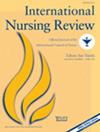Driving Diplomacy in Health Care: Exploring the Association Between the Diplomatic Leadership, Organizational Health, and Workplace Happiness Among Nurses
Abstract
Aim
This study explores the association between diplomatic leadership, organizational health, and workplace happiness among nurses.
Background
The internal work environment of organizations plays a crucial role in addressing challenges induced by external environmental factors, requiring adaptation strategies to address global issues to cope with their widespread impact. The relationship between the internal work environment and the ability of organizations to manage external pressures has been underexplored.
Methods
This descriptive correlational study involved 323 nurses. Data collection instruments included a demographic questionnaire, the diplomatic leadership scale, the happiness at work scale, and the organizational health scale. Statistical analyses were performed using SPSS version 26.0 (IBM Inc., Chicago, IL, USA).
Results
There was a statistically significant relationship between organizational health and diplomatic leadership and nurse happiness at work and also between diplomatic leadership and happiness at work. Furthermore, there was a statistically significant indirect effect of organizational health on nurse happiness at work when the diplomatic leadership acts as a mediator variable. Also, there was a statistically significant positive correlation between diplomatic leadership and nurse happiness and organizational health at work.
Conclusion and implications for nursing and/or health policy
The research findings offer valuable insights for hospital administrators and nursing managers, highlighting the importance of utilizing diplomatic strategies to address workplace challenges and contribute to policy development at both national and international levels. These results emphasize the need for policymakers to sustain focus on strategic initiatives that promote diplomatic leadership as a forward-thinking administrative approach. To support this direction, healthcare organizations should adopt and implement dedicated training programs that enhance diplomatic leadership competencies. These programs should aim to continuously develop the leadership skills of nursing managers while aligning their capabilities with the evolving demands of the healthcare environment.

 求助内容:
求助内容: 应助结果提醒方式:
应助结果提醒方式:


